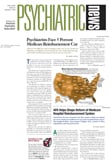Premiums and deductibles for Medicare enrollees will go up in 2004, the government has announced.
According to the Department of Health and Human Services, the deductible paid by beneficiaries for Medicare Part A—which pays for inpatient hospital, skilled nursing facility, and some home health care—will be $876 in 2004, an increase of $36 from this year’s $840 deductible.
The monthly premium paid by beneficiaries enrolled in Medicare Part B, which covers physician services, outpatient hospital services, certain home health services, durable medical equipment, and other items, will be $66.60. That represents an increase of 13.5 percent, or $7.90, over the $58.70 premium for 2003.
Medicare deductibles and premiums are updated annually in accordance with formulas set by law. The Part B premium is required to be the amount needed to cover 25 percent of estimated program costs for enrollees aged 65 and older. General revenue tax dollars cover the other 75 percent of the costs. The same statute prescribes the method for computing the Part A inpatient hospital deductible.
“These premium changes underscore the need to improve and modernize the Medicare program,” HHS Secretary Tommy G. Thompson said.
Most Medicare beneficiaries enrolled in Part B pay the monthly premium. The Part A deductible applies only to those enrolled in the original fee-for-service Medicare program. Those who enroll in private Medicare+Choice plans may not be affected by the Part A increase and may receive additional benefits with different cost-sharing arrangements.
The Part A deductible is the beneficiary’s only cost for up to 60 days of Medicare-covered inpatient hospital care. However, for extended Medicare-covered hospital stays, beneficiaries must pay an additional $219 a day for days 61 through 90 in 2004, and $438 a day for hospital stays beyond the 90th day in a benefit period. For 2003, the daily payment for days 61 through 90 was $210, and $420 for beyond 90 days.
Medicare’s longstanding 50 percent copayment requirement for outpatient psychiatric services remains in place—a point of ongoing contention for APA.
In April Sen. Olympia Snowe (D-Maine) and Sen. John Kerry (D-Mass.) introduced the Medicare Mental Health Copayment Equity Act to rescind the 50 percent copayment requirement. The bill (S 853) is under consideration by the Senate Finance Committee.
APA has endorsed the bill. “The 50 percent copayment requirement is simple discrimination,” the Association stated in an issue brief in April. “As far as APA can determine, beneficiaries are not required to pay more than the customary 20 percent copayment for any other services except outpatient psychiatric services. The 50 percent copay requirement is unfair to seniors, who must elect to pay for one-half of their psychiatric services. Despite widespread mental disorders in the geriatric population, many seniors do without needed mental illness treatment because of the high copayment. It is also unfair to the nonelderly, disabled Medicare population, many of whom have severe mental illness.”
APA’s issue brief, “Medicare Discrimination Against Mental Illness Treatment,” is posted on APA’s Web site at www.psych.org/advocacy_policy/leg_issues/physician_pay/medicarediscrimination.cfm. ▪
